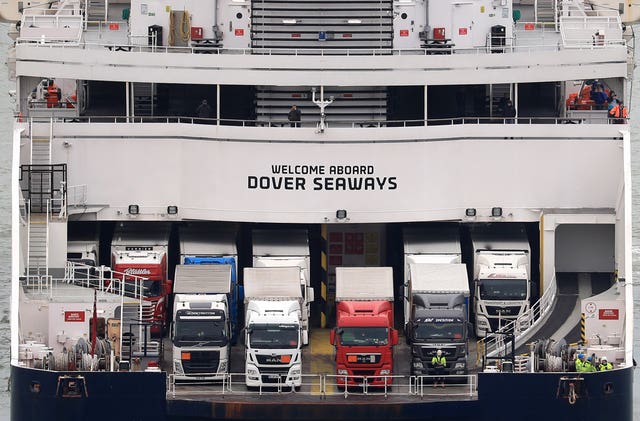MPs warned about risk of no-deal Brexit to food supplies
Leading supermarkets and fast-food chains warned about disruption to supply chains and the imposition of tariffs if there is no deal with Brussels.

Britons could face significant disruption to the supply of food if Theresa May fails to strike a Brexit deal with Brussels, leading retailers have warned.
Some of the country’s biggest supermarkets and restaurant chains warned that nearly a third of food consumed in the UK came from the European Union and would be hit by any delays at ports caused by a no-deal Brexit.
The imposition of tariffs and a collapse in sterling as a result of crashing out of the EU could also lead to price hikes for shoppers, they warned.
A letter to MPs ahead of Tuesday’s Commons votes on the next steps for Brexit warned it could be “difficult to restock stores if the supply chain is disrupted”.
Signatories to the letter include senior executives from Sainsbury’s, Asda, Marks & Spencer, Lidl, Waitrose, The Co-op and Costcutter.
The letter to MPs was also signed by bosses from McDonald’s, KFC and Pret A Manger.
They warned: “We are extremely concerned that our customers will be among the first to experience the realities of a no-deal Brexit.
“We anticipate significant risks to maintaining the choice, quality and durability of food that our customers have come to expect in our stores, and there will be inevitable pressure on food prices from higher transport costs, currency devaluation and tariffs.”
The UK is set to leave the European Union on March 29, with or without a deal.
The retailers warned that shortages in March would be “more acute” because of the seasonal nature of domestic food production.
Some 90% of lettuces, 80% of tomatoes and 70% of soft fruit is imported from the EU at that time of year and the perishable goods need to be moved quickly.
“This complex, ‘just in time’ supply chain will be significantly disrupted in the event of no deal,” the letter said.
“Even if the UK Government does not undertake checks on products at the border, there will still be major disruption at Calais as the French government has said it will enforce sanitary and customs checks on exports from the EU, which will lead to long delays; Government data suggest freight trade between Calais and Dover may reduce by 87% against current levels as a result.
“For consumers, this will reduce the availability and shelf life of many products in our stores.”

Reverting to World Trade Organisation rules would “greatly increase import costs, which could in turn put upward pressure on food prices”.
A decision by the UK to set tariffs at zero, as some Brexiteers have called for, would “have a devastating impact on our own farmers, a key part of our supply chains”.
The retailers warned that there was limited scope to address the challenges of a no-deal Brexit because of the inability to stockpile goods with short shelf lives.
All frozen and chilled storage is already in use, they said, and “even if there were more space it is impossible to stockpile fresh produce, such as salad leaves and fresh fruit”.
“Retailers typically store no more than two weeks’ inventory and it becomes difficult to restock stores if the supply chain is disrupted,” the letter said.
“We are also attempting to find alternative supply routes but there are limited options and not enough ferries, so this could only replace a fraction of the current capacity.”
The bosses – along with the chief executive and chairman of industry body the British Retail Consortium – urged MPs to “work with your colleagues in Parliament urgently to find a solution that avoids the shock of a no-deal Brexit on March 29 and removes these risks for UK consumers”.
A Department for Environment, Food and Rural Affairs spokesman said: “The UK has a high level of food security built upon a diverse range of sources, including strong domestic production and imports from other countries.
“This will continue to be the case whether we leave the EU with or without a deal.
“The Government has well-established ways of working with the food industry to prevent disruption – and we are using these to support preparations for leaving the EU.”





